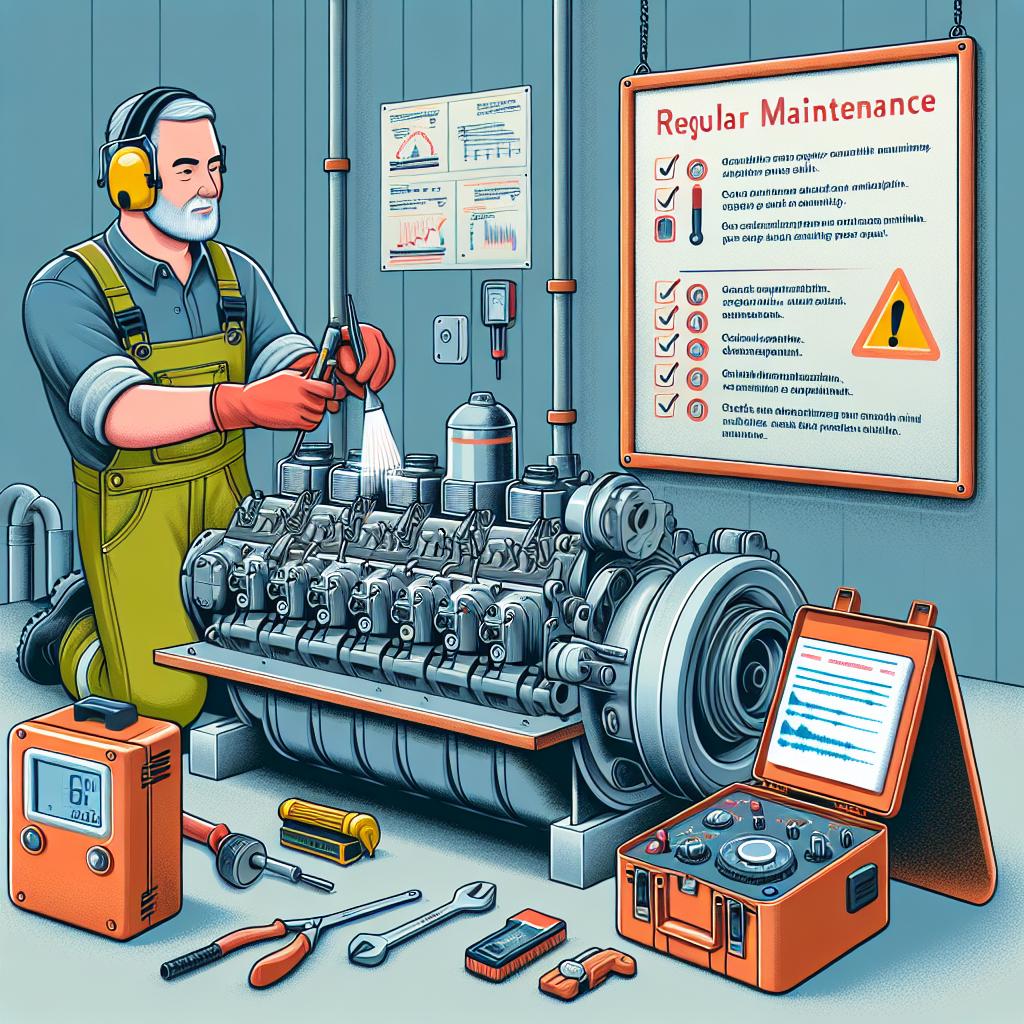In the bustling world of commercial spaces, where productivity and comfort intertwine, the importance of a controlled climate transcends mere convenience—it becomes a vital element of workplace efficiency. Among the various cooling solutions available, mini split AC systems have gained popularity for their adaptability and energy efficiency. However, as these units hum to life, they often introduce an unwelcome companion: noise. For business owners and facility managers, the challenge lies not only in maintaining a comfortable temperature but also in creating an environment conducive to focus and collaboration. In this article, we will explore effective strategies for minimizing noise levels from mini split AC systems, ensuring that the only sounds in your commercial space are those of creativity and productivity at work.
Understanding the Sources of Noise in Mini Split AC Systems
Mini split AC systems, known for their efficiency, can sometimes inadvertently contribute to noise pollution within commercial spaces. Understanding the origins of this noise can be pivotal in mitigating it. Key sources of noise include:
- Compressor Vibration: The compressor, often located outside, can generate significant vibrations; these vibrations may resonate throughout the building.
- Fan Noise: Both indoor and outdoor units feature fans that, when running at high speeds, can produce a constant hum.
- Refrigerant Flow: The movement of refrigerant within the system can create a gurgling sound, particularly in larger units.
- Piping and Ductwork: Poorly insulated or improperly installed pipes can transmit noise, making it more challenging to maintain a quiet environment.
To effectively address these noise sources, a combination of strategic planning and technical solutions may be employed. For instance, the installation of noise-dampening pads beneath the compressor can significantly reduce vibration transfer. Additionally, implementing sound-absorbing materials in walls and ceilings can help in achieving a quieter atmosphere. The following table summarizes potential mitigation strategies:
| Noise Source | Mitigation Strategy |
|---|---|
| Compressor Vibration | Use vibration isolation pads |
| Fan Noise | Opt for quieter fan models |
| Refrigerant Flow | Optimize refrigerant levels |
| Piping and Ductwork | Insulate pipes and install sound baffles |

Design Strategies for Optimal Acoustic Performance in Commercial Spaces
To achieve optimal acoustic performance in commercial spaces affected by mini split AC systems, it is essential to focus on several key design strategies. Acoustic insulation can significantly reduce noise transmission by utilizing materials with high sound-absorption properties. Common choices include acoustic panels, foam, and specialized drywall, which can be strategically placed in areas where noise levels are most disruptive. Additionally, using decoupling techniques in construction—such as floating walls or isolated structural elements—can help minimize the transfer of sound generated by the AC units. It’s crucial to ensure that the units are installed on vibration-dampening mounts to further reduce operational noise.
Another effective strategy is to create sound barriers within the layout of the space. This can be accomplished through the thoughtful arrangement of furniture, such as placing bookcases or decorative screens near sources of noise, which helps absorb and diffuse sound. Furthermore, implementing landscape solutions—like indoor plants or vertical gardens—can act as natural sound absorbers, breaking up sound waves and enhancing the overall aesthetic of the commercial environment. Here are a few additional considerations to keep in mind:
- Noise-canceling technologies: Utilizing devices designed to actively reduce background noise can complement other strategies.
- Regular maintenance: Ensuring that AC systems are well-maintained can prevent increased noise levels caused by mechanical issues.
- Zoning and layout: Positioning quieter work areas away from louder zones can improve overall comfort.

Effective Installation Techniques to Reduce Operational Noise
When it comes to limiting the operational noise of mini split AC systems in commercial settings, employing effective installation techniques is vital. First and foremost, selecting the optimal location for outdoor units can dramatically influence noise levels. It’s advisable to install these units on a flat, sturdy base to minimize vibrations. Additionally, consider positioning outdoor units away from high-traffic areas and walls, as this helps reduce noise reflections. Using vibration isolators can further dampen sound, making sure that the system operates quietly while delivering optimal performance.
Furthermore, proper insulation and soundproofing techniques should not be overlooked during installation. Wrapping refrigerant lines in insulated sleeves helps reduce noise transmission, while adding acoustic barriers around the outdoor unit can significantly muffle sound. Implementing strategic landscaping with shrubs or sound-absorbing materials can also aid in obstructing disruptive noises. For detailed comparisons of installation techniques, the following table outlines key factors to consider:
| Installation Technique | Impact on Noise | Recommended Action |
|---|---|---|
| Location Selection | Minimal reflection and obstruction | Install away from walls |
| Vibration Isolators | Reduces mechanical noise | Integrate during setup |
| Insulation of Lines | Minimizes noise transmission | Wrap with sound-absorbent materials |
| Acoustic Barriers | Muffles external sound | Create barriers around units |
| Landscaping | Reduces noise perception | Use shrubs strategically |

Regular Maintenance Practices to Sustain Quiet Operation
To ensure that your mini split air conditioning systems operate quietly and efficiently, regular maintenance is essential. Scheduled checks by a certified technician not only prolong the lifespan of the system but also significantly reduce the chances of operational noise. During these maintenance visits, technicians should focus on the following tasks:
- Cleaning the filters: Clogged filters can restrict airflow and lead to a noisier operation.
- Inspecting the fan blades: Ensuring they are free of debris can minimize vibration and noise levels.
- Tightening loose components: Regularly checking for any loose screws or fittings helps avoid rattling sounds.
- Checking refrigerant levels: Low refrigerant can cause the system to work harder, which increases noise.
In addition to professional maintenance, businesses can implement simple daily checks to maintain a quiet operational environment. Staff should be trained to observe these key practices:
- Monitoring the system regularly: Note any unusual noises or performance issues which may indicate a maintenance need.
- Keeping the area clear: Ensure that vents and outdoor units are unobstructed to maintain optimal airflow.
- Maintaining a clean environment: Dust and debris accumulation can contribute to noise, so routine cleaning around the unit is beneficial.
Q&A
Q&A: Minimizing Noise Levels from Mini Split AC Systems in Commercial Spaces
Q1: What exactly is a mini split AC system, and how does it operate?
A1: A mini split AC system is a type of air conditioning system that consists of an outdoor unit and one or more indoor units. Unlike traditional central air systems, mini splits do not require ductwork, which allows for more flexible installation in commercial spaces. The outdoor unit houses the compressor and condenser, while the indoor units are responsible for cooling individual rooms. Refrigerant circulates between the two, absorbing heat from the indoor air and releasing it outdoors.
Q2: Why is noise a concern when it comes to mini split AC systems in commercial settings?
A2: Noise levels are a key concern in commercial environments, particularly in spaces like offices, restaurants, and retail stores, where a peaceful atmosphere can enhance productivity and customer experience. Mini split systems can produce noise from both the indoor and outdoor units, impacting meetings, service quality, and overall ambiance. Reducing noise helps create a more comfortable environment for employees and clients alike.
Q3: What are some common sources of noise from mini split systems?
A3: The primary sources of noise in mini split systems include the compressor operation in the outdoor unit, the fan noise during air circulation, and vibrations that may resonate through walls or ceilings. Additionally, the indoor units might produce clicking or hissing sounds as they operate, particularly during startup and shutdown.
Q4: How can commercial space owners minimize the noise generated by mini split AC systems?
A4: There are several strategies to reduce noise levels:
- Placement: Ensure that outdoor units are situated away from high-traffic areas and are placed on a stable surface to minimize vibrations.
- Insulation: Use soundproofing materials around the units and ductless pathways to dampen sound.
- Maintenance: Regularly maintain the units to prevent unusual noises due to wear and tear. This includes cleaning filters and ensuring proper lubrication of parts.
- Select Quiet Models: When possible, choose mini split systems that are specifically designed to operate at lower noise levels, typically labeled as ‘quiet’ or ‘silent’ models.
- Sound Barriers: Installing vegetation, walls, or sound barriers can help absorb noise from outdoor units, further decreasing the impact on the surrounding areas.
Q5: Are there any technological advancements that can further help in minimizing noise?
A5: Yes, the HVAC industry continually evolves, introducing more sophisticated technologies. For example, some newer mini split models utilize inverter technology, which allows the compressor to adjust its speed according to the cooling demand. This can result in quieter operation compared to traditional fixed-speed compressors. Additionally, some manufacturers are developing acoustic blankets for outdoor units that can soften sounds produced during operation.
Q6: What other factors should be considered in conjunction with noise minimization?
A6: Alongside minimizing noise, it’s essential to consider energy efficiency, cooling performance, and overall system reliability. A well-balanced approach to HVAC system selection can lead to enhanced comfort and reduced operational costs, alongside a quieter environment. Regular consultations with HVAC professionals can help ensure that all these factors are harmonized effectively.
Q7: Can noise from mini split systems affect employee productivity or customer satisfaction?
A7: Absolutely. Studies show that excessive noise can lead to distractions, decreased productivity, and increased stress levels among employees. In commercial spaces like offices, the clamor can interfere with communication and focus. For clients in retail or dining environments, noise distractions can impact their overall experience and likelihood of returning. Therefore, implementing noise-reducing strategies for mini split systems not only enhances comfort but can improve overall business performance.
By understanding the importance of noise management in mini split AC systems and taking proactive steps, commercial spaces can create a conducive environment for productivity and customer enjoyment.
The Way Forward
As we draw the curtains on our exploration of minimizing noise levels from mini split AC systems in commercial spaces, it becomes clear that creating a harmonious environment is not merely a luxury, but a necessity. By investing in sound insulation, opting for high-quality units, and engaging in regular maintenance, businesses can transform their air conditioning experience from a disruptive presence to a seamless contributor to productivity and comfort.
In a world where every decibel counts, understanding and addressing acoustic concerns can be the key to maintaining a conducive workspace. The balance between temperature control and tranquility need not be a balancing act; with thoughtful planning and proactive measures, a serene atmosphere is within reach. So as you turn the page on this subject, remember that the quest for quiet is not just an engineering challenge—it’s an opportunity to enhance the well-being of everyone within those walls. Embrace the journey towards a more peaceful commercial space, where comfort and concentration can coexist in perfect harmony.

